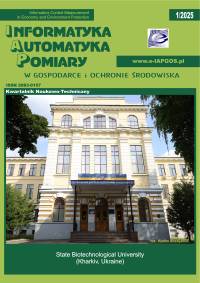AI-BASED FIELD-ORIENTED CONTROL FOR INDUCTION MOTORS
Elmehdi Benmalek
elmehdi.benmalek@um5s.net.maMohammed V University of Rabat (Morocco)
https://orcid.org/0000-0003-1078-1421
Marouane Rayyam
Mohammed V University of Rabat (Morocco)
Ayoub Gege
Mohammed V University in Rabat (Morocco)
Omar Ennasiri
Mohammed V University in Rabat (Morocco)
Adil Ezzaidi
Mohammed V University in Rabat (Morocco)
Abstract
The current article deals with the implementation of Reinforcement Learning based Field Oriented Control (FOC) for the induction motors (IM). It is pertinent to mention that although conventional controllers like PID are widely used in FOC induction, they are model-based and face problems such as parameter adjustment. PID controllers need to be tuned because of the approximations of the model, variations of the parameters during operation, and the external disturbances that are uncertain and unpredictable. RL is a machine learning approach that is model-free which can adapt to the variations and disturbances. Therefore, these controllers can be an excellent alternative to the conventional controllers. In this study, an RL-based controller was used to control the speed of the induction motor using the FOC and space vector modulation (SVM). Computational simulations were done using the MATLAB/SIMULINK to test the controllers’ performance under different operating conditions. This study highlights the effectiveness of RL in optimizing IM control, offering potential benefits in various industrial and automation applications.
Keywords:
induction motor, field-oriented control, NPC inverter, reinforcement learning, TD3 agentReferences
[1] Balal A. et al.: A review on multilevel inverter topologies. Emerging Science Journal 6(1), 2022, 185–200.
DOI: https://doi.org/10.28991/ESJ-2022-06-01-014
Google Scholar
[2] Barzegarkhoo R. et al.: Switched-capacitor multilevel inverters: A compre-hensive review. IEEE Transactions on Power Electronics 37(9), 2022, 11209–11243.
DOI: https://doi.org/10.1109/TPEL.2022.3164508
Google Scholar
[3] Blaschke F.: The principle of field orientation as applied to the new transvector closed-loop system for rotating-field machines. Siemens Review 34(3), 1972, 217–220.
Google Scholar
[4] Chinmaya K. A., Singh G. K.: Experimental analysis of various space vector pulse width modulation (SVPWM) techniques for dual three-phase induction motor drive. International Transactions on Electrical Energy Systems 29(1), 2019, e2678.
DOI: https://doi.org/10.1002/etep.2678
Google Scholar
[5] Ding Z. et al.: Introduction to reinforcement learning. Deep reinforcement learning: fundamentals, research and applications, 2020, 47–123.
DOI: https://doi.org/10.1007/978-981-15-4095-0_2
Google Scholar
[6] Goolak S. et al.: Mathematical modeling of an induction motor for vehicles. Eastern-European Journal of Enterprise Technologies 2(2), 2020, 104.
DOI: https://doi.org/10.15587/1729-4061.2020.199559
Google Scholar
[7] Hari V., Narayanan G.: Space-vector-based hybrid pulse width modulation technique to reduce line current distortion in induction motor drives. IET Power Electronics 5(8), 2012, 1463–1471.
DOI: https://doi.org/10.1049/iet-pel.2012.0078
Google Scholar
[8] Hasse K.: On the dynamics of speed control of a static ac drive with a squirrel-cage induction machine. Ph.D., TH Darmstadt, 1969.
Google Scholar
[9] Kumar P., Hati A. S.: Review on machine learning algorithm based fault detection in induction motors. Archives of Computational Methods in Engineering 28, 2021, 1929–1940.
DOI: https://doi.org/10.1007/s11831-020-09446-w
Google Scholar
[10] Memon A. Y.: Reinforcement Learning Based Field Oriented Control Of An Induction Motor. Third International Conference on Latest trends in Electrical Engineering and Computing Technologies (INTELLECT). Pakistan, Karachi, 2022, 1–8.
DOI: https://doi.org/10.1109/INTELLECT55495.2022.9969403
Google Scholar
[11] Patel P. J., Patel V., Tekwani P. N.: Pulse-based dead-time compensation method for self-balancing space vector pulse width-modulated scheme used in a three-level inverter-fed induction motor drive. IET Power Electronics 4(6), 2011, 624–631.
DOI: https://doi.org/10.1049/iet-pel.2009.0292
Google Scholar
[12] Qi X., Cao W., Aarniovuori L.: Reinforcement learning based parameter lookup table generating method for optimal torque control of induction motors. IEEE Transactions on Industrial Electronics 70(5), 2022, 4516–4525.
DOI: https://doi.org/10.1109/TIE.2022.3189103
Google Scholar
[13] Sistani M. B. N., Hesari S.: Decreasing Induction Motor Loss Using Reinfor-cement Learning. Journal of Automation and Control Engineering 4(1), 2016.
Google Scholar
[14] Stender M., Wallscheid O., Böcker J.: Accurate torque estimation for induction motors by utilizing a hybrid machine learning approach. IEEE 19th International Power Electronics and Motion Control Conference (PEMC). 2021, 390–397.
DOI: https://doi.org/10.1109/PEMC48073.2021.9432615
Google Scholar
[15] Tamilvani M. et al.: Harmonic reduction in variable frequency drives using active power filter. Bulletin of Electrical Engineering and Informatics (BEEI) 3(2), 2014, 119–126.
DOI: https://doi.org/10.12928/eei.v3i2.270
Google Scholar
[16] Torrey D. A., Selamogullari U. S.: Modelica implementation of field-oriented controlled 3-phase induction machine drive. 2nd Int. Modelica Conf., DLR, Oberpfaffenhofen, Germany 2002, 173–182.
Google Scholar
[17] Vaezi S. A., Iman-Eini H., Razi R.: A New Space Vector Modulation Technique for Reducing Switching Losses in Induction Motor DTC-SVM Scheme. 10th International Power Electronics, Drive Systems and Technologies Conference (PEDSTC). Iran, Shiraz, 2019, 184–188.
DOI: https://doi.org/10.1109/PEDSTC.2019.8697889
Google Scholar
[18] Wang F. et al.: Advanced control strategies of induction machine: Field oriented control, direct torque control and model predictive control. Energies 11(1), 2018, 120.
DOI: https://doi.org/10.3390/en11010120
Google Scholar
[19] Wang H. N. et al.: Deep reinforcement learning: a survey. Frontiers of Information Technology & Electronic Engineering 21(12), 2020, 1726–1744.
DOI: https://doi.org/10.1631/FITEE.1900533
Google Scholar
[20] Zahraoui Y., Akherraz M., Fahassa C.: Induction Motor DTC Performance Improvement By Reducing Torque Ripples in Low Speed. U.P.B. Sci. Bull., Series C 81(3), 2019, 249–260.
Google Scholar
[21] Zhang Z. et al.: Novel Direct Torque Control Based on Space Vector Modulation With Adaptive Stator Flux Observer for Induction Motors. IEEE Transactions on Magnetics 46(8), 2010, 3133–3136.
DOI: https://doi.org/10.1109/TMAG.2010.2051142
Google Scholar
Authors
Elmehdi Benmalekelmehdi.benmalek@um5s.net.ma
Mohammed V University of Rabat Morocco
https://orcid.org/0000-0003-1078-1421
Authors
Marouane RayyamMohammed V University of Rabat Morocco
Authors
Ayoub GegeMohammed V University in Rabat Morocco
Authors
Omar EnnasiriMohammed V University in Rabat Morocco
Authors
Adil EzzaidiMohammed V University in Rabat Morocco
Statistics
Abstract views: 77PDF downloads: 117










